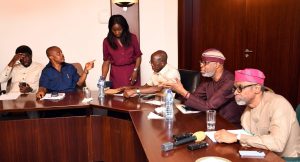
A crucial meeting held between representatives of the Federal Government and organized labor, aimed at averting an impending strike by the Nigeria Labour Congress (NLC) and Trade Union Congress (TUC), ended in a deadlock on Monday night.
The meeting, chaired by the Minister of State for Labour and Employment, Nkeiruka Onyejeocha, failed to convince the unions to suspend their planned strike scheduled for February 23.
In a parallel development, the Association of Master Bakers and Caterers of Nigeria issued a warning that they may initiate a shutdown by February 27, 2024, if the Federal Government does not fulfill the agreement reached with the association in 2020.
Responding to the impasse, the Minister of Information and National Orientation, Mohammed Idris, expressed hope that the labor unions would reconsider their position, emphasizing that a strike would not be in the best interest of the nation.
The NLC and TUC had previously issued a 14-day nationwide strike notice to the Federal Government on February 8, citing the government’s failure to implement agreements reached on October 2, 2023, following the removal of fuel subsidy. In a joint statement, the labor unions expressed disappointment over the non-fulfillment of crucial agreements, highlighting the government’s disregard for the welfare and rights of Nigerian workers.
One of the key agreements made after the removal of fuel subsidy was the payment of a N35,000 wage to federal workers, effective from September of the previous year, pending the enactment of a new national minimum wage law. The resolution also included provisions for cash transfers to vulnerable Nigerians and the provision of 100 compressed natural gas (CNG) buses nationwide to alleviate transportation costs.
Hakeem Ambali, the Vice President of the NLC, reaffirmed the unions’ determination to proceed with the strike unless the Federal Government addresses the hardships faced by Nigerians due to the removal of fuel subsidy. Ambali expressed disappointment over the government’s failure to fulfill its commitments, such as the timely provision of buses and the full payment of the wage award.
The meeting between the labor minister and the unions aimed to review the level of implementation of the October agreement, but it revealed significant non-compliance by the government. Ambali stressed that the agreements were time-bound and emphasized the urgency for the government to fulfill its obligations to avert the impending strikes.
Another NLC official clarified that the Ministry of Labour and Employment serves as an intervention platform and is not in a position to make offers. However, the unions scheduled a follow-up meeting with the labor minister to continue negotiations.
The President of the NLC, Joe Ajaero, addressing the Second National Labour Adjudication and Arbitration Forum organized by the Nigeria Employers Consultative Association, highlighted the government’s failure to implement agreements as the main reason for the lack of positive outcomes in social dialogues. Ajaero advocated for an annual review of workers’ minimum wages to address the economic hardships caused by government policies.
Ajaero also raised concerns about the government’s “promise and fail” approach, expressing disappointment over the non-implementation of the 16-point agreement signed in October of the previous year. He emphasized the need for meaningful social dialogue and called for an amendment to the minimum wage law to allow for more frequent negotiations based on inflation and economic conditions.
As the impasse persists, the nation waits to see if further negotiations can resolve the growing concerns over the cost of living and prevent the impending strikes.
The government has been slow to decide what to do with the removed fuel subsidy, taking eight months while it took only 24 hours to announce the subsidy’s removal.
The wage award of N35,000 has not been paid, and workers are owed salaries.
The absence of Compressed Natural Gas (CNG) buses on the roads has contributed to the dissatisfaction of the labor unions.
The government representative, represented by the Cabinet Affairs Official Richard Pheelangwah, urged the labor unions to embrace tripartism and social dialogue, emphasizing collaboration and mutual understanding.
The Secretary to the Government of the Federation (SGF) emphasized the need to find a sustainable equilibrium that protects workers’ well-being without jeopardizing business viability and overall economic health.
The SGF encouraged the labor unions to embrace alternative mechanisms like mediation and arbitration to achieve resolutions and foster trust among stakeholders.
The government representative highlighted the broader public service obligations discharged by the government to cushion economic hardships, such as infrastructure investment, expansion of social safety nets, and investment in gas-powered transportation systems.
The Association of Master Bakers plans to withdraw its services nationwide from February 27 due to multiple taxation and the high costs of baking materials.
The association accused various government agencies of imposing levies on its members and demanded the liberalization of flour and sugar importation, reduction or removal of import duties, provision of concessionary forex exchange, and reduction of tariffs on imported wheat and sugar.
The association called for financial support palliatives for bakers who have suffered due to the COVID-19 pandemic and the suspension of taxation on the bakery industry.
The Premium Breadmakers Association of Nigeria declared support for the master bakers’ planned strike, highlighting the government’s lack of attention to the bakers’ plight.
These developments indicate the growing frustration among labor unions and bakers due to the government’s failure to fulfill promises and address key issues such as rising costs of living and multiple taxation. The situation remains tense, and the strike actions and protests are expected to continue unless the government takes concrete steps to resolve the grievances.

